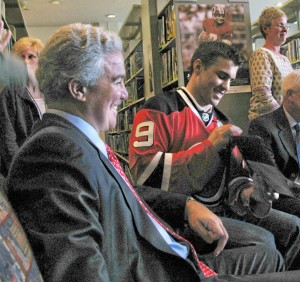By Mike Colligan

Forbes has released their annual NHL franchise valuations for 2010 and, for the most part, results were as anticipated. The Phoenix Coyotes are bleeding cash and the average fan of the most valuable franchise, the Toronto Maple Leafs ($505m), still pays $114 a ticket to complain about GM Brian Burke.
Here are five interesting thoughts after digesting the Forbes data:
1. Shocking Secret to Increasing Value: Win a Stanley Cup
The only franchises to see their value fluctuate by at least 20%, the Montreal Canadiens (+20%) and Tampa Bay Lightning (-24%), were both influenced by ownership transactions in the past year.
Okay, maybe not that surprising, but the second-highest percentage increase in value was the Stanley Cup winning Chicago Blackhawks (+16%). It seems like ages ago that the late Bill Wurtz was systematically eroding a hockey fanbase in one of the largest US markets by refusing show games on television.
His son Rocky’s revival of the Hawks culminating in a Cup this spring is one of the best franchise turnaround stories in recent sports history.
2. Why Aren’t the Dallas Stars Sold Yet?
If the key to increasing value is on-ice success and a Stanley Cup, what is Tom Hicks waiting for? From Forbes:
Tom Hicks is selling the Stars to pay off $200 million of debt owed by Hicks Sports Group, the team’s holding company. In August the team and its 50% interest in the American Airlines Center could have sold for around $275 million. But the money losing team has not been making interest payments and lenders have been funding its operations.
With the franchise valued at $227m (down 8% from last year) and an internal budget restricting payroll and front office expenditures, a Stanley Cup isn’t going to fall out of the sky in D-Town. Hicks and the lenders need to unload the team while it’s still the most valuable franchise on the market (by Forbes’ numbers) and find an owner willing to spend money to make money.
With a promising young core already in place and a franchise center (Brad Richards) in the final year of his contract, an ownership resolution in the next few months could have the Stars contending for a Cup almost overnight.
3. The New Jersey Devils (Really) Need to Win
Finding the net just four times in 24 games have most agreeing that the $100m man Ilya Kovalchuk has been a disaster. Others like Sean Leahy of Yahoo! Sports Puck Daddy, who joined us on The Hockey Writers Live last Sunday, are preaching patience at least until Kovalchuk can play a handful of seasons under his 15-year deal.

Owner Jeff Vanderbeek may not have that luxury. Little has changed in the most recent Forbes numbers since we took a peek behind the Devils’ curtain in August, making the team’s 8-14-2 start all the more troubling. Kovalchuk’s aura hasn’t resulted in higher attendance like the team had originally hoped as ‘The Rock’ is filling at just 83.4% capacity this year (down from 88.1% last season).
Still saddled with enormous debt (115% debt/value ratio), Vanderbeek will at least benefit from having the NBA’s New Jersey Nets as temporary tenants in his Prudential Center for the next two seasons. Beginning in 2012-13, he’ll either need GM Lou Lamoriello to build a post-Brodeur team with drawing power or have to pray for some form of salvation in a new CBA. Kovalchuk’s actual salary jumps from $6m to $11m that season and under the current system the Devils would be paying out far more in salaries than the NHL cap.
It’s safe to say this summer’s Kovalchuk saga was only the first chapter in what will become one of the NHL’s most interesting stories to follow.
4. Sunny Future in the Sunshine State
Disappointing numbers don’t tell the story of the bright future for the Lightning and Florida Panthers.
In Tampa it shouldn’t be a surprise that Jeffrey Vinik, former manager of the legendary Fidelity Magellan Fund, has pounced on a cheap franchise run into the ground by previous owners Len Barrie and Oren Koules. The Lightning’s 24% decline in value is not as much an indication of the promise of the team as it is proof that Vinik purchased an undervalued asset for $93m in February. GM Steve Yzerman gets all the attention, but Vinik has hand-picked an impressive staff from top to bottom that should build one of the league’s most successful franchises.
Further south in Sunrise, Florida, another promising story has gone relatively untold since Cliff Viner and Stu Siegel took over the Florida Panthers late last year. Forbes says:
Viner has installed a three-year plan to turn around the money-losing team, which has not made the playoffs since the 1999-2000 season. Viner has pushed hard on new marketing initiatives and has secured 10,000 full season tickets for the 2010-11 season. The team has also reduced capacity at the arena by nearly 2,500 seats to create a more intimate atmosphere
Selling 10,000 season tickets for a team that hasn’t made the playoffs in a decade and had little hope of ending that stretch this year is hard to believe. Dale Tallon built a champion in Chicago and his aggressive moves since signing on as Panthers GM in May have put the team in position to be competitive within Viner’s three-year window.
5. The New CBA is a Success
Amidst the near-constant loophole drama and NHLPA ‘Fehr-mongering’, most are anticipating Armageddon when the current CBA expires on September 15, 2012. But with five seasons in the books under the salary-capped system, is it finally time for fans to maybe, just maybe, give commissioner Gary Bettman some credit?
On the heels of an economic recession, Forbes has the NHL’s 30 teams combining to generate $160 million of operating income on revenue of $2.9 billion. In 2003-04 heading into the lockout, the same crew at Forbes had the NHL losing a combined $96 million on revenue of $2.2 billion (2002-03: Lost $123 million on $2.1 billion revenue).
Believe it or not, the system in place is working.
Profitable seasons for teams ‘in the red’ last year, like the Washington Capitals and Pittsburgh Penguins, are almost guaranteed in the very near-term. While Burke continues to reach for the roster defibrillator every few months in an effort to spark the Leafs, Nashville Predators GM David Poile has been busy quietly constructing playoff teams on a shoestring budget.
All 30 teams will never be managed equally and effectively under the cap. That doesn’t mean the system isn’t working. Changes will always need to be made, but the product on the ice is as exciting as it’s ever been in the last two decades.
With contentious CBA negotiations on the horizon in the other major sports, that’s a great sign for the NHL.
Mike – I just got around to reading this – Outstanding. Thanks for sharing your insight. This article will be highlighted in our Newsletter tomorrow.